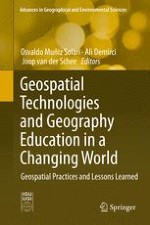2015 | OriginalPaper | Buchkapitel
8. Practice of Geospatial Technologies in Informal Learning
verfasst von : Osvaldo Muñiz Solari, Melody Crenshaw
Erschienen in: Geospatial Technologies and Geography Education in a Changing World
Verlag: Springer Japan
Aktivieren Sie unsere intelligente Suche, um passende Fachinhalte oder Patente zu finden.
Wählen Sie Textabschnitte aus um mit Künstlicher Intelligenz passenden Patente zu finden. powered by
Markieren Sie Textabschnitte, um KI-gestützt weitere passende Inhalte zu finden. powered by
